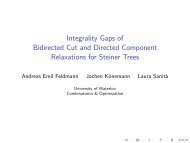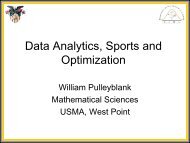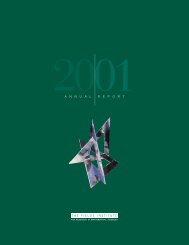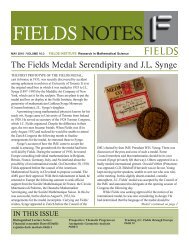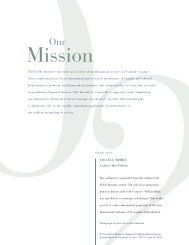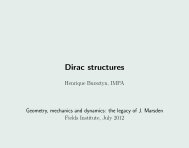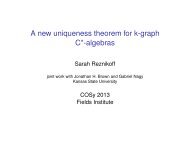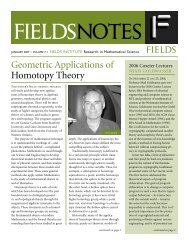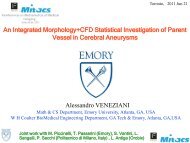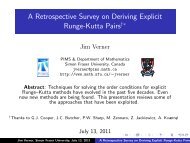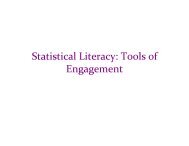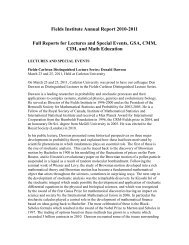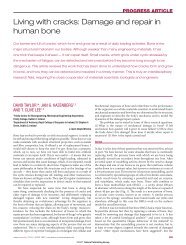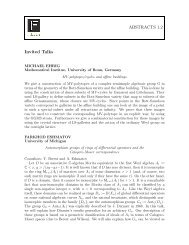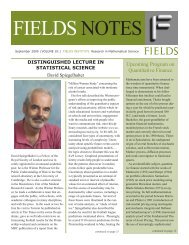Annual Report 2005 - Fields Institute - University of Toronto
Annual Report 2005 - Fields Institute - University of Toronto
Annual Report 2005 - Fields Institute - University of Toronto
You also want an ePaper? Increase the reach of your titles
YUMPU automatically turns print PDFs into web optimized ePapers that Google loves.
Workshop participants<br />
Speakers:<br />
Randy Berry (Northwestern)<br />
Spectrum sharing games<br />
George Kesidis (Penn State)<br />
Coupled Kermack-McKendrick models for randomly scanning<br />
and bandwith-saturating internet worms<br />
Richard La (Maryland)<br />
Providing guaranteed packet loss rate in wireless networks in<br />
the presence <strong>of</strong> random interference<br />
Jang-Won Lee (Princeton)<br />
Implications to network utility through physical and medium<br />
access layer innovations<br />
Roland Malhame (Ecole Polytechnique Montreal)<br />
Optimal scheduling <strong>of</strong> data transmission in wireless networks<br />
Ravi Mazumdar (Waterloo)<br />
Random mobility models in ad hoc networks: capacity and<br />
delay issues<br />
Michael Neely (Southern California)<br />
Stochastic control <strong>of</strong> ad-hoc networks: delay, energy, fairness<br />
Asuman Ozdaglar (MIT)<br />
Competition and Efficiency in Communication Networks<br />
Saswati Sarkar (Pennsylvania)<br />
Stochastic control problems in MAC layer wireless multicast<br />
G e n e r a l S c i e n t i f i c A c t i v i t i e s<br />
Sanjay Shakkottai (Texas at Austin)<br />
The price <strong>of</strong> anarchy in min-cost multicast with network coding<br />
R. Srikant (Illinois at Urbana Champaign)<br />
Scheduling in multihop wireless networks<br />
K. S. Srisankar (Motorola)<br />
QoS provisioning in wireless ad-hoc networks<br />
Edmund Yeh (Yale)<br />
Power control, rate allocation, and routing in stochastic wireless<br />
networks<br />
Workshop on Empirical Likelihood Methods<br />
May 9–11, <strong>2005</strong><br />
Held at the <strong>University</strong> <strong>of</strong> Ottawa<br />
Organizers: Mayer Alvo (Ottawa) and Jon Rao (Carleton)<br />
Inference based on likelihood methods has proven very<br />
effective in the past. The methods can be used for constructing<br />
tests with good asymptotic properties, confidence<br />
intervals with accurate coverage probability as well as<br />
to pool data from different sources. Unfortunately in<br />
parametric statistics one must suppose that the underlying<br />
family <strong>of</strong> distributions is known, save for some parameters<br />
which are estimated from the data. The use <strong>of</strong> parametric<br />
methods when the underlying distributions are unknown<br />
can lead to incorrect tests and inaccurate confidence intervals.<br />
Empirical Likelihood has been applied successfully in<br />
determining confidence intervals whose shape and orientation<br />
is dictated by the data. These intervals also respect the<br />
range <strong>of</strong> the parameter space. The method has proven effective<br />
in audit sampling where lower confidence bounds are<br />
used to compute the amount <strong>of</strong> money owed to government<br />
for example. The empirical confidence intervals outperformed<br />
the parametric likelihood intervals by providing<br />
large lower bounds respecting the nominal error rate.<br />
Art Owens (Stanford) presented a tutorial on empirical<br />
likelihood methods. This was followed by presentations<br />
by Jon Rao, Jiahua Chen, Changbao Wu, P.K.Sen, Mayer<br />
Alvo, Qunshu Ren and Yongson Quin. There was a good<br />
exchange <strong>of</strong> ideas throughout the workshop, which will<br />
undoubtedly translate into a vigorous research in this<br />
growing field.<br />
<strong>Fields</strong> <strong>Institute</strong> <strong>2005</strong> ANNUAL REPORT 77



